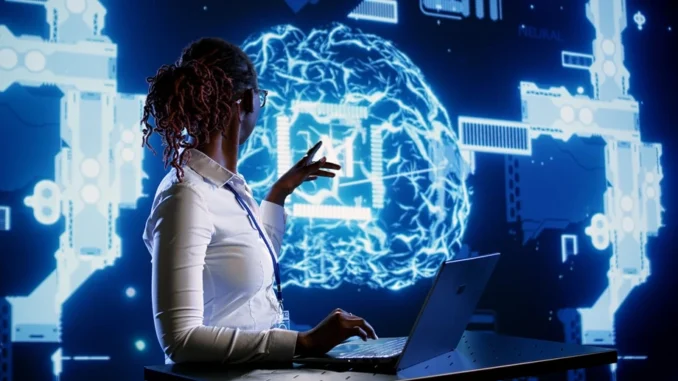
Creating a better future for all through artificial intelligence (AI) involves harnessing the capabilities of this technology to address global challenges, enhance quality of life, and promote equity and accessibility. Here are some key areas where AI can make a significant impact:
### 1. **Improving Education** AI can revolutionize learning by personalizing education and making it more accessible.









– **Personalized Learning**: AI-driven tools can adapt educational content to individual learning styles and paces, helping students grasp challenging concepts more effectively.
– **Access to Resources**: Online learning platforms powered by AI can provide access to quality education for underserved populations, bridging educational gaps.
– **Tutoring and Support**: AI chatbots can offer 24/7 assistance for students, answering questions and helping with homework, thus enhancing learning outside of traditional classrooms.
### 2. **Advancing Healthcare**
AI has the potential to transform healthcare delivery and outcomes.
– **Early Diagnosis**: Machine learning algorithms can analyze medical data to identify diseases at earlier stages, improving treatment outcomes.
– **Telemedicine**: AI can enhance telehealth services, providing remote care and consultations to patients, particularly in rural or underserved areas.
– **Drug Discovery**: AI can accelerate drug discovery processes, reducing the time and cost associated with bringing new medications to market, ultimately benefiting patients.
### 3. **Supporting Economic Growth**
AI can foster economic development by creating new jobs, boosting productivity, and enhancing innovation.
– **Job Creation**: While AI may automate certain tasks, it will also create new roles in fields such as AI ethics, data science, and machine maintenance.
– **Increased Efficiency**: AI technologies can streamline operations in various industries, increasing productivity and reducing costs, which can lead to greater economic growth.
– **Entrepreneurial Opportunities**: Startups can leverage AI for innovative solutions across sectors, driving economic diversification and resilience.
### 4. **Addressing Climate Change**
AI can play a crucial role in environmental sustainability efforts.
– **Energy Efficiency**: AI systems can optimize energy consumption in buildings and transportation, reducing carbon footprints.
– **Predictive Analytics**: AI can analyze climate data to forecast extreme weather events, helping communities prepare for and mitigate the effects of climate change.
– **Biodiversity Conservation**: AI can monitor wildlife populations and ecosystems, aiding conservation efforts and promoting sustainable practices.
### 5. **Enhancing Social Equity**
AI can reduce disparities by making services more accessible and inclusive.
– **Access to Services**: AI solutions can facilitate access to essential services for marginalized communities, including healthcare, legal support, and financial services.
– **Bias Reduction**: By integrating fairness into AI design, we can mitigate biases in algorithms, ensuring equitable treatment across different demographic groups.
– **Empowering Communities**: AI tools can equip communities with knowledge and resources, enabling them to advocate for their rights and improve their circumstances.
### 6. **Promoting Public Safety**
AI can improve public safety while balancing civil liberties.
– **Emergency Response**: AI can optimize emergency response efforts by analyzing real-time data to allocate resources effectively during disasters.
– **Crime Prevention**: Predictive policing models can analyze trends in crime data, helping law enforcement to proactively address potential issues while ensuring ethical considerations.
– **Public Health Monitoring**: AI can track disease outbreaks and assist in managing public health initiatives by analyzing health data and trends.
### 7. **Enabling Smart Cities**
AI can facilitate the development of smart cities that enhance urban living.
– **Traffic Management**: AI can optimize traffic flow, reduce congestion, and improve public transportation efficiency through real-time data analysis.
– **Waste Management**: AI-powered technologies can enhance recycling efforts and waste collection, contributing to cleaner urban environments.
– **Public Engagement**: AI can help officials gather citizen feedback on city planning and services, fostering transparent governance and community involvement.
### 8. **Ethical AI Development**
For AI to benefit everyone, it must be developed and used responsibly.
– **Regulatory Frameworks**: Establishing clear guidelines for the ethical use of AI can help prevent misuse and protect individuals’ rights.
– **Transparency and Accountability**: Ensuring that AI systems are transparent and that organizations are held accountable for their use leads to trust and confidence in technology.
– **Inclusive Innovation**: Engaging diverse groups in AI development ensures that solutions are designed with the needs of all stakeholders in mind, promoting inclusivity and equity.
### Conclusion
The vision of a better future through AI is achievable but requires a collaborative approach. Stakeholders, including governments, businesses, and civil society, must work together to shape AI development and applications that prioritize ethical considerations, inclusivity, and sustainability. By investing in AI solutions that serve the common good, we can address pressing global challenges and create more equitable, prosperous communities for everyone.

Leave a Reply